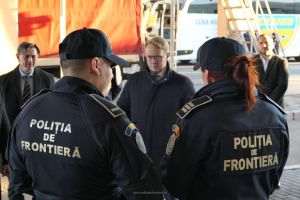Reporter: Mr. Mihai Bogza, as president of the Foreign Investors Council, how would you describe the evolution of the business environment in Romania in the year that has just ended?
Mihai Bogza: It could have been a very good one. We have benefited from the resumption of the economic growth in the EU member countries, and that was visible, in the volume of the exports, just as we have seen an exceptional agricultural year, which led to very good harvests. Unfortunately, when it comes to what was exclusively up to us Romanians, things were different, so in the long run I am concerned that we have missed the chance of turning the economic performance of 2013 into one that is sustainable in the long run.
Reporter: Are you suggesting that the authorities haven't done anything good for the economic sector?
Mihai Bogza: That would be an exaggeration. There have been certainly some positive things, but especially in the last part of the year there have been some measures that will have a negative effect on the future performance of the economy.
Reporter: Let's start with the good things...
Mihai Bogza: These concern mostly measures which we, the FIC, have been asking for for a long time. One of them is the passing of Emergency Government Ordinance 88/2013, which, among other things, sets criteria for public investments. In an interview given one year ago, I was complaining that without this kind of criteria, the public funds intended for investments are being wasted on thousands of objectives at the same time, and as a result very few projects come to completion, one such example being the highways. We are hoping that the new Ordinance will get things in order in this area. It's also us, the FIC, who proposed to the Executive to create an entity that would monitor the manner in which the various agencies and ministries are implementing the economic program of the Government, as well the various commitments taken on by them. The same Emergency Ordinance I mentioned before makes it a step forward in that regard, creating a national verification, monitoring and control system for public entities, in terms of the financial statements, legal commitments and budgets.
Reporter: And when will these provisions be implemented?
Mihai Bogza: It is unclear yet, but the sooner the better for the Romanian economy.
Reporter: Do you have any more examples?
Mihai Bogza: Another proposal that we, the FIC we have constantly endorsed, was increasing the transparency of the authorities in adopting the economic legislation, by improving consultation with all the interested parties. Well on October 31st 2013 the law 281 was passed, which amends the law 52/2003 concerning the transparency in decision making in the public administration sector, meaning it stipulated the clearer obligation of the authorities to organize public consultations. It is a shame however that in Romania the good laws are not implemented - following this law a series of measures in the fiscal sector and in other sectors were implemented without any consultation with the ones they would affect.
Reporter: I've seen that the FIC has publicly protested against these taxes, as well as against the way the consultation was made concerning the Insolvency Code.
Mihai Bogza: Let's end with the positive things, I will return to the negative ones. So, I want to mention the law concerning the taxation of holdings, another thing that the FIC has been asking for for a long time, the ability to opt for a fiscal year that is different than the calendar year, the option to choose between the implementation of the payment of the VAT owed upon the issue of the invoice or the postponement of the payment of VAT for authorized companies, as well as improving the degree of absorption of European grants, even if this was far below the commitments of the Government. Finally, we have seen a "thawing" of the Bucharest Stock Exchange, which was a result of the listings of Nuclearelectrica and Romgaz, among other things.
Reporter: From what you've presented so far, it would look like the government has proven extremely receptive to the requests of the investors. The prioritization of the public investments, the transparency of the legislative act and the monitoring of the commitments of the Government were the three priorities you were pursuing in 2013, according to the interview you gave me in November 2012. So, with that being the case, where do your grievances come from?
Mihai Bogza: The number of proposals we made was far higher. And like I was saying, many of those we made in 2013 have only been approved, there is a long way to go before their actual implementation happens. What's worse, one of the measures previously taken were implemented in a manner which would have hardly allowed them to express their positive effects - look at how the implementation of the Emergency Government Ordinance 109/2011 concerning the introduction of professional management in state-owned companies was done, a very good initiative which is about to be totally compromised. And on top of that, there have been some measures that run the risk of dealing a powerful blow to the private sector, and to significantly affect the performance of the economy not just in 2014, but in the coming years as well.
Reporter: I assume you are first of all referring to the taxes announced ...
Mihai Bogza: It seems completely illogical in a year when the country had an increase of the economic growth of 2.7% over the previous year, and absorbed the equivalent of European funds in 2013 that it absorbed in the previous five years (according to the statements of the authorities) and when "the clever boys" who were leeching off the energy companies have been successfully eliminated, thus saving hundreds of millions on the budget according to the same statements, that the Government would place an additional burden on the private sector, when it is not even making any effort to provide this sector with the infrastructure needed for improving its activity - for example, in 2013 the spending with investments of the public decreased, instead of rising. In other words, we, the private sector, will pay more in taxes in 2014 without even having the hope that the state would give us something more in return for those higher taxes. The argument to the authorities for increasing taxes was that if they didn't do that, we would have exited the agreement with IMF, but that is not true, the IMF was only asking us to fit within a certain budget deficit limit, which could have done by lowering expenditures or improving collection, measures which we, the FIC have been supporting for a long time, and have been doing so with concrete proposals. Furthermore, the new taxes are part of the analysis presented in the report "Paying taxes 2013 - The global picture" according to which the total level of taxation in Romania, which includes profit tax, labor taxes and the rest of the taxes applicable to the companies, is 44.2%, thus putting us far below Bulgaria, which we are often compared to, somewhere above the average of the European Union of 42,6%.
The tax hikes of for 2014 will have at least two very harmful effects: on one hand it will transfer resources from the private sector to the public sector, which is at any rate less efficient, and in the private sector, it will further favor those that do tax evasion, to the detriment of those that pay their taxes correctly, seriously distorting competition, the main pillar of any market economy. The result will be a decrease of the competitiveness of the Romanian economy, which had still a lot of ground to make up, in that regard, and a drastic slowdown of the increase of the GDP, perhaps even causing it to drop.
Reporter: In other words, the private sector will pay more to the public sector so that the people protected by the New Criminal Code or by the new law on amnesty will have more to steal from...
Mihai Bogza: We don't use that kind of language, but, when you've seen every political party blame the one that governed before it for the corruption in the use of the public funds there has to be something true about it, and if that is the case, then the degree of tolerance of society to acts of corruption would need to be stricter, rather than more tolerant... That is why we investors were completely shocked at the attempt to promote the laws in question virtually overnight, at the end of last year. Their coming into effect would mean that it's been declared open season to commit any acts of corruption in Romania, if I was to use an expression that has been frequently used in the media, and the investors' attitude to Romania, which is already hesitant, would be dealt a very powerful blow. We are hoping that no matter how great the pressure coming from those who support these laws, the other politicians will show the necessary wisdom to block this poisonous initiative.
Reporter: So according to you Romania still has a problem with corruption. Isn't this offset by the improvement in the manner of operation of the judicial system?
Mihai Bogza: In 2013 we have seen some progress, by achieving some convictions in some cases of major notoriety, and it is clear that institutions such as the National Anti-Corruption Department (DNA), the Department to Counter International Organized Crime and Terrorism (DIICOT) or the High Court of Cassation and Justice (ICCJ) are on a rising trend. On the other hand, last year has brought to light, at least in some cases, the ugly part of the Romanian judicial system. Remember the case of Dinel Staicu, where the prosecutors have revealed the way they were negotiating how harsh or how lenient the convictions would be. I gave this example because in 2000 I was involved, due to the position I held in the NBR, in the shutdown of the International Bank of Religions, which was robbed by Staicu in complicity with the management of the bank, and I couldn't believe it how for ten years the thief has been yelling "Catch the thieves!", keeping in line with Romanian tradition, and when he was finally convicted, a few female judges defied a definitive ruling of the High Court of Cassation and Justice, by releasing him. Of course, the fact that the prosecutors got a conviction in this case is a positive one, but if in a case of such prominence something like that can happen, is it any wonder how negatively some of the judges involved in commercial lawsuits such as insolvency proceedings are viewed? Speaking of which, in the tens of thousands of cases we have had in the last few years, how many convictions for bankruptcy fraud? And did you see many creditors pleased with the way the reorganizations of insolvent companies are conducted or with the amounts recouped?
Reporter: So, once again we come to the Insolvency Code...
Mihai Bogza: The way insolvencies are managed in Romania is particularly important for the business sector, in order to avoid having the sick portion of the economy affect the healthy one too much. I sincerely hope that the talks that will take place in the Parliament will lead to the passing of a better Insolvency Code, which would then leave even less room for abusive implementation.
Reporter: I take it you want to end this interview on an optimistic note?
Mihai Bogza: All those who have invested in this country have made a bet on its future and are required to do everything that is up to them to ensure its success. The FIC will always remain open to having a dialogue with the authorities in order to improve the business sector, so that the Romanian economy will soon end up to a truly European level of development. We are not necessarily optimistic, but we will do whatever is in our power for things to improve.
Reporter: Thank you!






























































